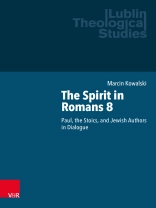Kowalski addresses the Pauline understanding of S/spirit in Romans 8, as compared to the Stoic idea of pneuma. The author first analyzes the Stoic views on pneuma perceived in a variety of life-giving, cognitive-ethical, unifying, reproductive and inspiring functions. The aforementioned features are taken as a starting point for the comparison with Paul to which, however, the third element is added, the Jewish texts of the Second Temple period. These include the Old Testament but also The Book of Enoch, The Book of Jubilees, Qumran, The Testaments of the Twelve Patriarchs, The Psalms of Solomon, Philo of Alexandria, Flavius Josephus, LAB, Joseph and Aseneth, 4 Book of Ezra and 2 Book of Baruch. Such a rich comparative material contributes to the novelty of the book and enables the reader to discover both the similarities and differences between Paul, Greco-Roman and Jewish authors. The study analyzes Romans 8 in its rhetorical context and brings to light the novelty of the Pauline view of the Spirit. The apostle portrays it in its primary cognitive-ethical and communitarian function of making the believers similar to Christ and inculcating in them the Lord’s mindset and attitudes. Paul presents the Spirit as dwelling within a person, similarly to God inhabiting the Jerusalem temple, and as the mediator of the resurrected life. In the original Pauline take the Spirit enables a close union between God and human beings in which the latter keep their freedom and distinctive personal traits.
เกี่ยวกับผู้แต่ง
Marek Jagodziński, Prof. Dr. hab., is Professor in the Chair of the Orthodox Theology at the Faculty of Theology, The John Paul II Catholic University of Lublin, Poland, and Major Seminary in Radom, Poland.












